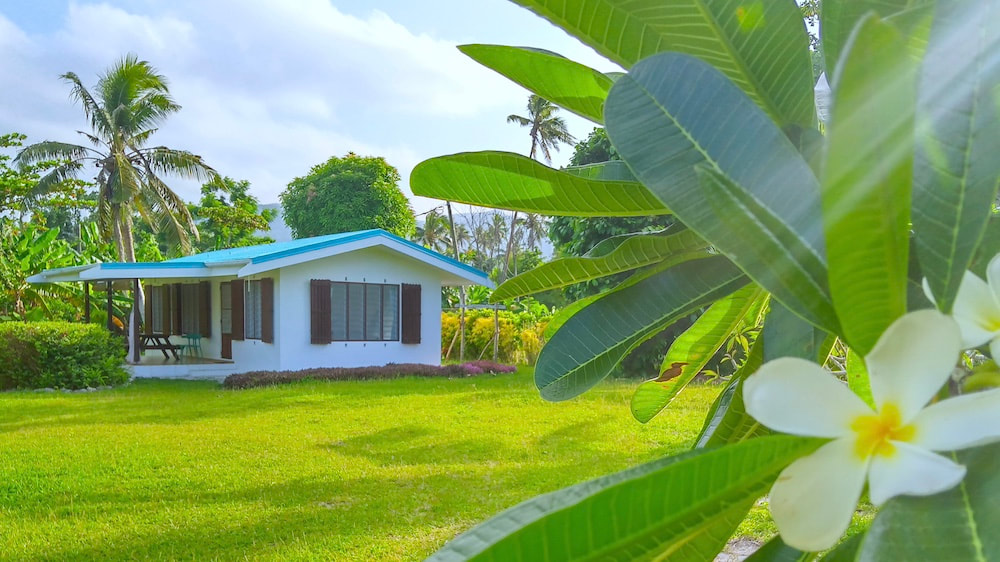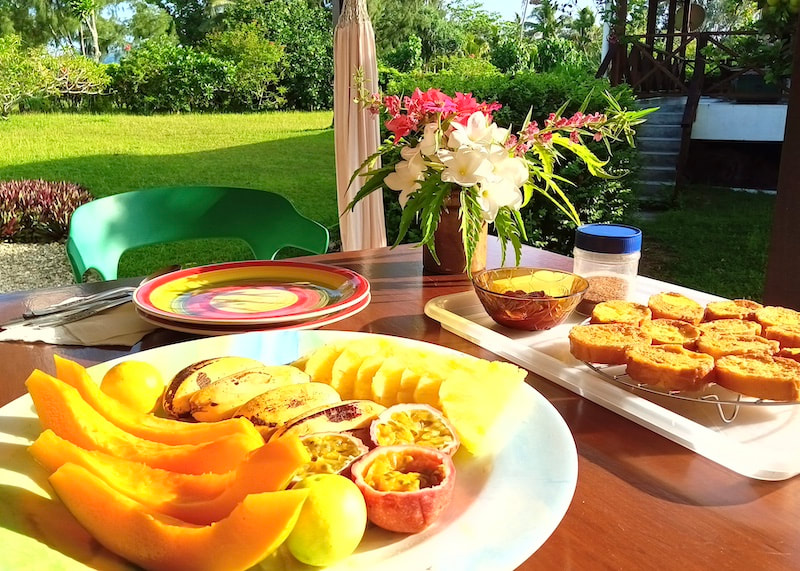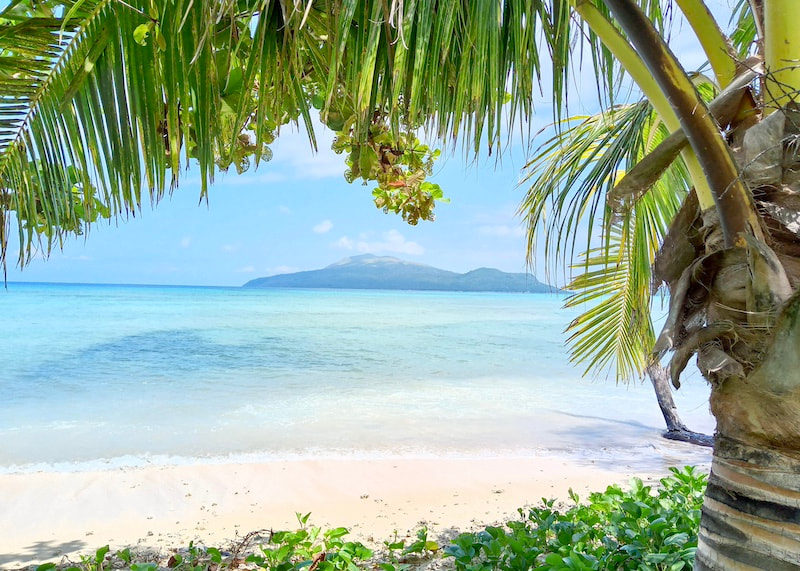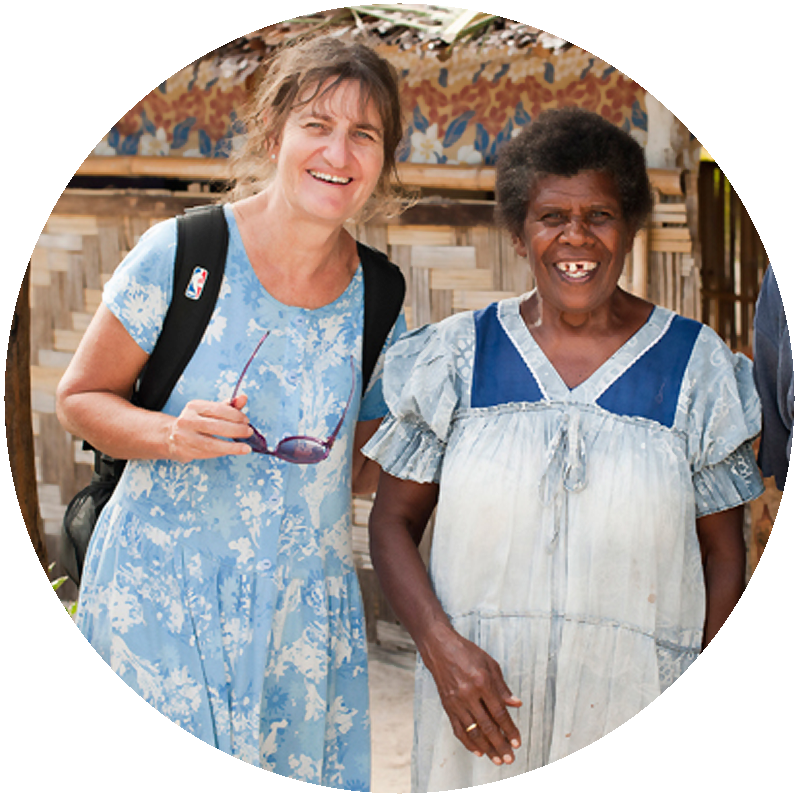|
Janet and I are ‘working’. It’s the best kind of work. Sitting on the shaded veranda of her guesthouse in the late afternoon, updating her compendium. On the one side her chooks are making contented thank-you-for-feeding-me noises, on the other Brownie, her dog, gnaws a piece of coral. Welcome to Malowia Guesthouse we head the first page in big, bold letters. Then Janet writes: In our local language, ‘Malowia’ means good or nice place. I hope you enjoy your time here. That, to say the least, is an understatement. It’s hard to find words to adequately describe just how good or nice it is here. How could you not enjoy it? Malowia Guesthouse, a very good and nice place to be. I look around, trying to view it as a first-time guest would. Coconut palms, sparkles of sea through the hedge, glimpses of Nguna Island across Undine Bay, Janet’s blue roofed house . . . I’m lost in the tropical wonder of it all. “Do you think I should keep this bit about Willie and the children?” Janet brings me back to the task at hand. “Absolutely!” I say. “Guests will be curious about things like that. It gives them context.” Paunangisu is the home village of my late husband, William (Willie), and I came from England fifty years ago. I am now retired here among our extended family. I have three grown-up children and seven grandchildren. I met Janet the first week I was in Vanuatu during our ‘village stay’, a kind of induction into local culture for VSA volunteers. We were being hosted by relatives of Willie’s. Paunangisu is on the island of Efate, about an hour’s drive north from the capital of Port Vila. ‘We’ meaning Keith and I. He’s sitting here now, not saying much (which is his usual style) but keeping us on track when our chatter sends us off on tangents. I remember how curious I was about Janet. Here we were, in this traditional village where chickens and brown-skinned children and pigs roamed free but everyone seemed to know where they belonged. Where food was prepared on a fire in an outdoor kitchen and eaten on mats on the open air coral-floored dining area. Where it felt as though we’d slipped in another world, another time. We followed Leinte, our host mama, through the overwhelm of newness and hotness into the garden to bash lemons from the top of a straggling tree with a stick. Along a path to what turned out to be a shop to buy a bag of sugar. Down to Aunty Janet’s whose hens would provide the eggs, Leinte assured us. Our five short Bislama lessons were hopelessly inadequate and her English smol. As far as we could make out we were going to make lemon curd. Lemon curd? Really? Apparently. How or why we didn’t know. We’d noticed Janet’s house when we’d wandered down to the sea in search of a cooling breeze. It was different to the other houses in the village, colonial-styled, white-walled with wooden shutters and a deep veranda edged with tropical flowers. Leinte greeted the NiVanuatu man sitting in a chair in the corner of it in ‘language’; Uncle Willie. A woman greeted us in a strong Yorkshire accent from behind the screened kitchen door; Aunty Janet. Is Vanuatu ever going to stop surprising me? I remember thinking at the time. And in the fourteen years since, it never has. We really did make lemon curd. Well, Janet did and it was delicious. She was somewhat anxious that it wasn’t setting exactly as she liked, but once we got back to our house in Vila and put it in the fridge, it thickened up beautifully. That was beginning of a friendship and connection with the village that continues even now, even though we left Vanuatu more than eight years ago. Hopefully it extends far into the future. There have been some changes. Janet built the guesthouse and my volunteer role with the Shefa Tourism Office meant I was actively involved in promoting it. Electricity came to the village, along with fridges to set lemon curd properly and a few other simple mod cons and conveniences. Several severe cyclones, including TC Pam, barrelled their way through. But essentially the place feels the same. It’s true that we’re older. Leinte, who was lamenting her lack of grandchildren when we first met her, now has five that she and her husband Kalfau care for almost full-time. And Willie lost his long struggle with Parkinson’s disease the year before last. He’s buried in the tiny village graveyard just across the road from the guesthouse. “So he’s never too far away,” Janet says. Yesterday evening Leinte and Kalfau arrived carrying our dinner. Lap-lap manioc (for me) and lap-lap banana (for Keith) wrapped in banana leaves with lots of the crispy brown bits they remembered are my favourite. Breadfruit cooked in a way that actually makes it palatable for me. Some crunchy local nuts. We knew preparing this food would have taken most of the day and we felt truly spoilt. As we sat eating and sharing storian late into the night under impossibly bright stars, there wasn't anywhere in the world I’d rather have been. Malowia is my happy place. I think about the stream of people who make their way to Janet’s guesthouse and wonder about the serendipities that bring them here to the edge of the Coral Sea. Imagine their stories and the memories they’ll take away with them. Malowia. A good and a very nice place indeed. We did eventually finish updating Janet’s compendium. You can download it here
Visit the website: www.malowiaguesthouse.com Find Malowia on Google Maps Notes: The local language of North Efate is Nakanamanga Bislama words:
|
AuthorAuthor: Dianne Archives
February 2024
Categories |
|
|
|
Website by South Seas Design
|
Copyright: Telling Travel Tales 2016 - 2024 ALL RIGHTS RESERVED
|




 RSS Feed
RSS Feed